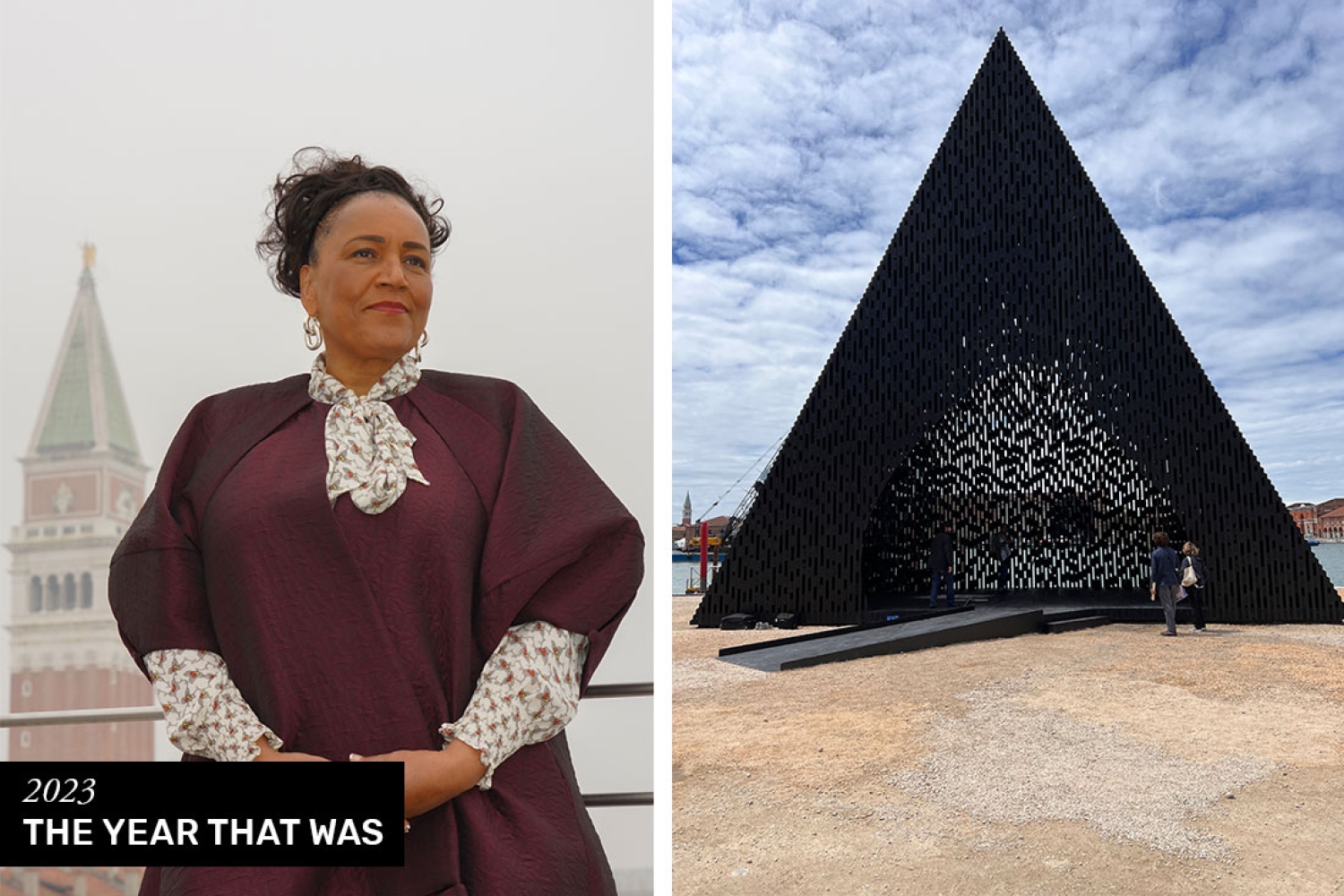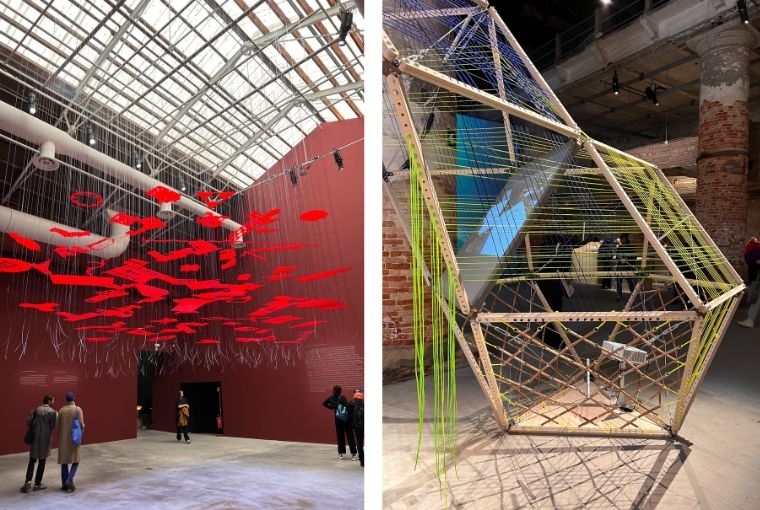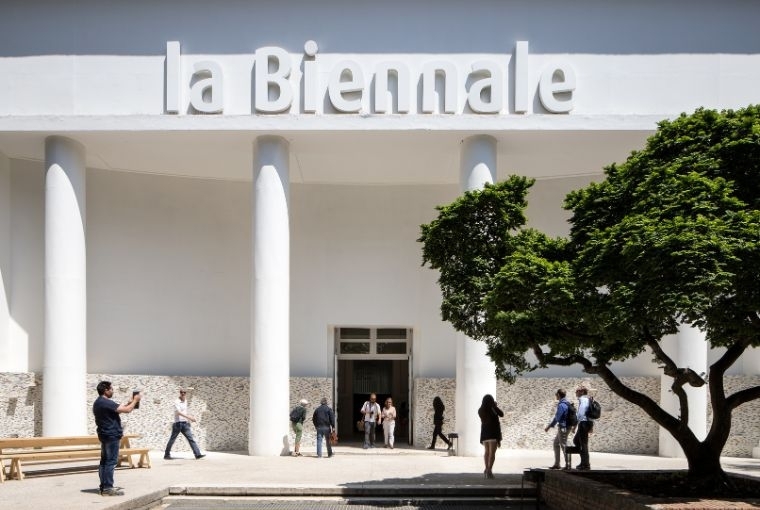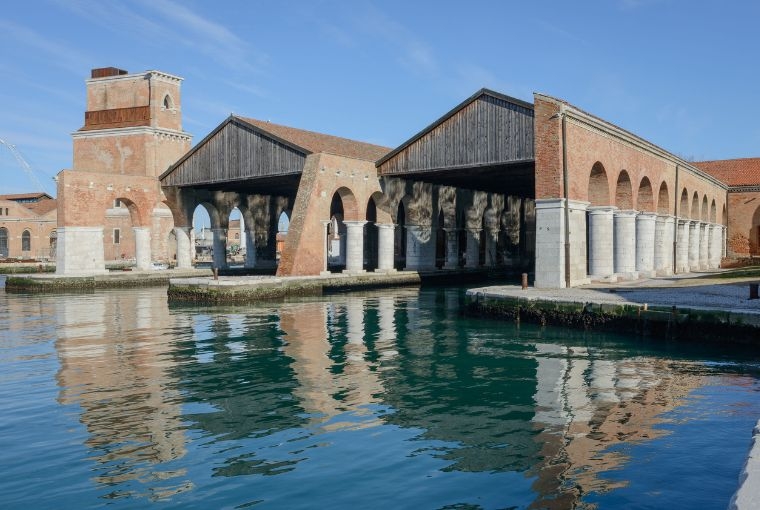

The Venice Architecture Biennale marked its eighteenth edition in 2023. Held from 20th May to 26th November, the Biennale was curated by Lesley Lokko, a highly esteemed architect and academic. She is known to have established the Graduate School of Architecture (GSA) at University of Johannesburg in 2015 and the African Futures Institute, an African school dedicated to postgraduate architecture education in Accra, Ghana, in 2021. To learn more about her vision for last year’s Biennale, Martand Khosla delves into an insightful and extensive dialogue with her about architecture, education, inclusion and more.
Martand Khosla: You’ve curated a retelling of architecture and I think the deliberate balance of race and gender of the participants is a critical part of this story. Yet the site of discourse is the West — Venice. And since you have practiced in different contexts, in your experience, how does the story get told based on where you are?
Lesley Lokko: So, it’s a really interesting question and it’s actually quite a complex question to answer, because even though there are regional discourses around architecture, the kind of balance of power, in terms of cultural capital, is still heavily tipped in favour of, I would say, the Global North, not so much in terms of the con- tent of those conversations, but certainly around the platforms and the kind of infrastructure required to have sustained events and conversations that are looked at or listened to or heard by many, particularly many outside the context. So even though I find that we have multiple myriad, really interesting, intense conversations here, let’s say in West Africa, for one thing, that’s quite a regional conversation, then maybe there’s a larger continental conversation. Those conversations tend to be held in isolation even now.
So, what somebody in West Africa says, does not get picked up in what Eastern Africans are talking about, it doesn’t get picked up in South Africa and curiously, the only places where we tend to talk to one another happen to be in the Global North. And that is something I think has been in existence for ten or twenty years and it doesn’t seem to change. And just by way of making a kind of concrete example of what I mean, the other day I had the pauses with all the national pavilion curators and this is all very much centred on Africa, on the diaspora, on the Global South, but there were only three African countries participating — Egypt, South Africa and Niger. And the two curators for the Niger Pavilion are Italian. So, you kind of see how the rest of the world is listening to what we are saying, but often we are not listening to each other in terms of what we’re saying.

MK: I think in a sense, you’re talking about great inequalities and I think so many of these get defined by where capital is located. I think there remain axes of inequalities within singular societies as well. And that’s something that you have also been working with. How do you address these inequalities? If we look at India, where I’m situated, caste becomes the dominant axis of inequality and of course, religion, to some extent. In the United States, it becomes race. It becomes class in England, so these are so many other subsets of the larger macro inequalities that exist. How have these conversations worked out as zones of discourse, through architecture in Ghana and South Africa and now in Europe?
LL: Very good question. And I think you hit the nail on the head in that each location has its own lens. I won’t repeat them, but in certain places, there are intensifications of existing lenses. So, in South Africa, it’s all about race and class. I mean, you cannot open your mouth before that becomes a topic or dominant paradigm for a conversation in Ghana. What’s quite interesting is that it’s not really an internal inequity lens, it’s more to do with who has access to outside, to overseas. And there’s a phrase we use here in Ghana all the time, which is, you know, ‘hi, how are you, have you travelled?’ And when people say, ‘have you travelled’ it means, did you go overseas? So, the inequity here is between those who go overseas and those who don’t. And there is a kind of tension and I would say resentment in the local community between those who have access to resources, platforms, ideas, exposure, conversations that don’t always take place here.
Having said that, one of the first things that I was determined to do at the African Futures Institute would be to try and draw a cry into that global network of, I guess you call it, the lecture circuit. And initially, people kept saying, oh, nobody’s going to come here, you know, it’s too far, it’s too expensive, there’s too much malaria. All the kinds of questions that you can imagine. But people came. And slowly, the same thing happened in Johannesburg, is that once the location began to be seen as a viable participant in these conversations, the internal conversation started to get more confident, more assertive, more dare I say it, inclusive. So, it was interesting to me that the change, the shift, wasn’t so much to get more people to go out to the world. It was kind of to get the world to come here. And that’s been the dominant, I guess, the principle the institute was founded on.

MK: Leaving Ghana or travelling out, implies an inherent aspect of class because it has to do with access to the capital. It’s also like, do you go to the world or does the world come to you? Did you find that type of the discourse becoming more charged up and was there a certain atten- tion that came out of the discourse as a result of this?
LL: It came out in a really interesting way. So, we record all our lectures. And so, in the first set of lectures, it was very much a lecturer coming here saying something about their practice, their paradigms, their ambitions or whatever. And people sitting quite passively by about the sixth or seventh conversation, there began to be these really heated exchanges about why did it seem easy to do something some- where else and one couldn’t do it here. So, through the lens of the invited practitioner or academic, or whoever it was, people were using the opportunity to ask ques- tions about here. So, the distance between here and there began to get blurred in a very interesting way that people were now using there actually to reflect and talk about what is happening here. And it made me acutely aware that, you know, one of the responsibilities I think of any urban architectural community, is to extend or expand the role of architecture away from the provision of buildings, which is very much the way we, in this part of the world, see it towards the building of knowledge, the building of capacity, the building of confidence, the building of competence. Like, it’s a metaphor for building society in a way. And so, the school is one thing and the training is one thing but all the peripheral activities go around the publications; the exhibitions, the talks, the discourse. You know, somebody has to put that in place. And often it’s a school, sometimes it’s an institute, sometimes its the institute of architects, but without it, those systemic inequities, I think just never get addressed.

MK: I think you’ll find a lot of my questions are, of course, informed by where I’m situated, which is also in the Global South, in India. But I think that there are a lot of similarities that we see across the Global South, whether it’s Karachi or Caracas or Ghana. Like in the direction of material, it could be concrete and glass forms that want to mimic the urban landscapes of the Middle East or Singapore here, while the western architectural community almost always celebrates the architecture of India and other developing economies for our interpretation of the exotic traditions. Our own citizens, for the large part, reject that form of architecture, how do we course correct on two fronts? For the west, how do we move away from becoming the mascots of the exotic? But more importantly, at home, how does an architecture get encouraged that is formally climatically materially relevant?
LL: They’re really big questions. And in a way, I guess I try to tackle those at a more, at a very intimate level. And by ‘intimate’, I mean more at the scale of the practice. So, education for me remains a really potent field because the kind of intent of education is to be critical, to change, to shift, to push, to propose alternatives that’s kind of embedded or should be embedded in its psyche in a way. And so, working with young students and architects, young graduates, to encourage them to think more deeply, thoughtfully and critically, I think is one way.
But the other way is that I think architects are taste makers and it seems like such a facile way to describe influence. But taste, for me, has been really key. And it’s to do with aesthetics, it’s to do with politics, it’s to do with society, it’s to do with resistance. It’s quite a complex set of tools, if you like. And so, I tend to think about what we do in terms of how it will influence someone’s perception, whether that’s a city official, whether it’s a planner, whether it’s a developer and to understand these sorts of changes are really long term. You know, when I was working in South Africa, when we set up the graduate school, the vice chancellor, a very dear friend, kept saying to me, you are talking all about decolonisation and transformation and you’re going to radically reinvent the university, but when I look around and I see your school of architecture, I see the same white boys teaching that I saw ten years ago.
So, where are all these decolonised practitioners and architects that you talk about? And I kept saying to him that it’s our job to make them. It’s not our job to go out and find them. We are involved in a two generation process. And I think, I feel that about architecture, that it’s here for the long run and that small incremental changes that you make in the life of a student, a practitioner, actually do add up to something.
MK: I can’t help but think about speed. When I think of cycles of architecture, there is an insane speed here in India. If I look at the smaller towns and villages, there is a complete absence of the ‘architect’. We see incremental self-built, need based architecture, where you build your first house, followed by additions when your child gets married and it is all happening without architects. I’m just wondering whether a more radical shift towards a slower architecture that you propose or perhaps the pedagogical model actually moves outside of the institutions and make the citizen a participant in how architecture develops?
LL: Absolutely. I mean, I think that’s the huge conundrum is that on the one hand, the kind of forces of capital are moving at a speed that’s completely unprecedented. But my thinking is that if we don’t think about the context in which architects are trained and made quite radically and we’re not brave enough to rethink those structures in fifty or seventy years’ time, the problems that we have now will just have been exacerbated fifty or seventy fold. So, in a way, I think we almost have no choice but to think about the undoing of everything in order to reconstruct something new. And the only way I know how to do that in education is to use the imagination.
So rather than train students, which is kind of the model that’s always being exported, certainly to the colonies, is you train people to be competent and efficient in x, y, z. Actually, you have to train people to think differently and sometimes that can happen quickly. I have seen it that when students are confronted with challenges that are outside of the academy, the young are quick, they pick stuff up, it’s often that our curricula won’t allow them to do it. So, for me, it was really important when I started the African Futures Institute, that it wasn’t a school of archi- tecture, it was an institute that would exist outside of those paradigms, because I’ve come to see that the university is practically the last place where change happens, for all kinds of reasons.
Excerpt from May-Oct 2023 platform Bookazine.
Words Martand Khosla
Date May, 2023